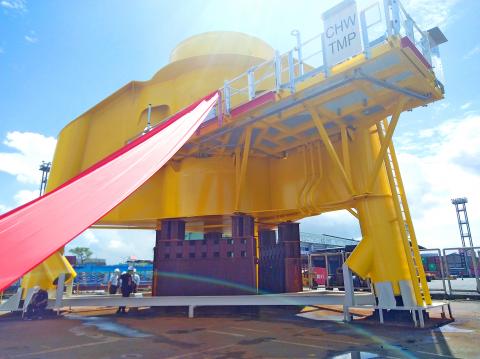Sing Da Marine Structure Corp (SDMS, 興達海洋基礎), a subsidiary of China Steel Corp (中鋼), in cooperation with Orsted A/S, yesterday unveiled a transition piece mockup for wind farm jacket foundations in Kaohsiung in a step closer to profitability for the two companies, which entered a multimillion-dollar supply contract in November last year.
“We aim to complete the first transition piece by December or January next year at the latest,” SDMS chairman Joseph Y.C. Wang (王亞洲) told reporters on the sidelines of the ceremony.
“We plan to complete our first jacket foundation between May and July next year,” he said, adding that the company is investing up to NT$6.84 billion (US$218.8 million) to expand its facility at Kaohsiung’s Sing Da harbor by adding a new plant that would be ready in the first quarter next year.

Photo: Natasha Li, Taipei Times
“We are eyeing billions in revenue once we reach full production capacity by the end of 2021,” Wang said, adding that the firm would then produce an average of 48 to 50 jacket foundations per year, or about one a week.
SDMS is on a tight schedule as the company is set to provide Danish wind farm developer Orsted with 56 jacket foundations by 2021 for its first 900-megawatt project off the coast of Changhua County.
“Everything is going according to plan,” Orsted Changhua 1+2 Windfarm project cochief executive officer Frida Persson said.
Orsted is confident that the jacket foundations would be delivered on time after the Danish firm contracted 10 overseas experts to assist SDMS with production.
SDMS would be delivering its products in batches, Wang said, adding that “each would need to pass rigorous testing and quality control.”
Once the company has mastered the necessary techniques to meet international standards, it would be able to take advantage of business opportunities in the Asian-Pacific region, Wang said.
The company is eyeing opportunities in Japan’s developing offshore wind farm market, he said.

BYPASSING CHINA TARIFFS: In the first five months of this year, Foxconn sent US$4.4bn of iPhones to the US from India, compared with US$3.7bn in the whole of last year Nearly all the iPhones exported by Foxconn Technology Group (富士康科技集團) from India went to the US between March and last month, customs data showed, far above last year’s average of 50 percent and a clear sign of Apple Inc’s efforts to bypass high US tariffs imposed on China. The numbers, being reported by Reuters for the first time, show that Apple has realigned its India exports to almost exclusively serve the US market, when previously the devices were more widely distributed to nations including the Netherlands and the Czech Republic. During March to last month, Foxconn, known as Hon Hai Precision Industry

Taiwan Semiconductor Manufacturing Co (TSMC, 台積電) and the University of Tokyo (UTokyo) yesterday announced the launch of the TSMC-UTokyo Lab to promote advanced semiconductor research, education and talent development. The lab is TSMC’s first laboratory collaboration with a university outside Taiwan, the company said in a statement. The lab would leverage “the extensive knowledge, experience, and creativity” of both institutions, the company said. It is located in the Asano Section of UTokyo’s Hongo, Tokyo, campus and would be managed by UTokyo faculty, guided by directors from UTokyo and TSMC, the company said. TSMC began working with UTokyo in 2019, resulting in 21 research projects,

Taiwan’s property market is entering a freeze, with mortgage activity across the nation’s six largest cities plummeting in the first quarter, H&B Realty Co (住商不動產) said yesterday, citing mounting pressure on housing demand amid tighter lending rules and regulatory curbs. Mortgage applications in Taipei, New Taipei City, Taoyuan, Taichung, Tainan and Kaohsiung totaled 28,078 from January to March, a sharp 36.3 percent decline from 44,082 in the same period last year, the nation’s largest real-estate brokerage by franchise said, citing data from the Joint Credit Information Center (JCIC, 聯徵中心). “The simultaneous decline across all six cities reflects just how drastically the market

Ashton Hall’s morning routine involves dunking his head in iced Saratoga Spring Water. For the company that sells the bottled water — Hall’s brand of choice for drinking, brushing his teeth and submerging himself — that is fantastic news. “We’re so thankful to this incredible fitness influencer called Ashton Hall,” Saratoga owner Primo Brands Corp’s CEO Robbert Rietbroek said on an earnings call after Hall’s morning routine video went viral. “He really helped put our brand on the map.” Primo Brands, which was not affiliated with Hall when he made his video, is among the increasing number of companies benefiting from influencer